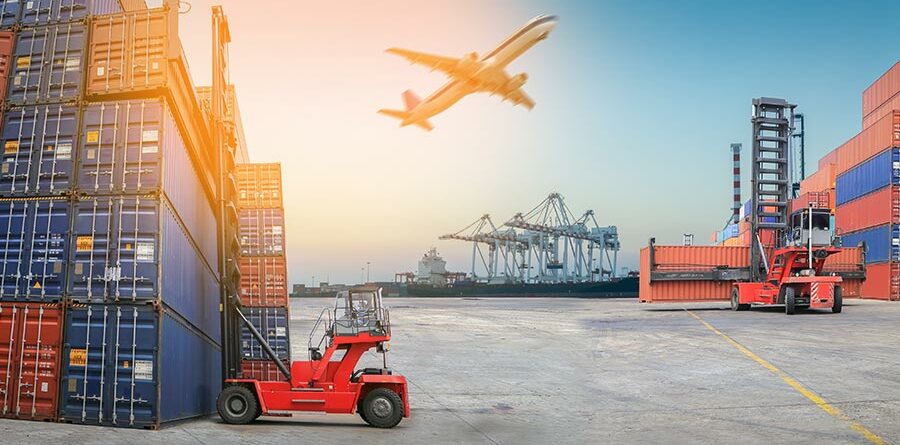What is Freight Forwarding?
Freight forwarding refers to the process of organizing and coordinating the shipment of goods from one place to another on behalf of a client. A freight forwarder is a third-party logistics provider that acts as an intermediary between the shipper and various transportation services, including air, sea, and ground carriers.
Freight forwarding services include:
Freight forwarding services typically include managing documentation, arranging for the transportation of goods, and handling customs and other regulatory requirements. The freight forwarder may also offer additional services, including cargo insurance, warehousing, and distribution.
Primary Goal
The primary goal of freight forwarding is to ensure that goods are transported from one location to another in a safe, timely, and cost-effective manner. Freight forwarders play a vital role in the global economy by facilitating trade and commerce between countries and regions.
Role of freight forwarder
The role of a freight forwarder is to act as an intermediary between shippers and various transportation services, such as air, sea, or ground carriers, to ensure that goods are transported from one location to another in a safe, timely, and cost-effective manner. Here are some of the specific responsibilities of a freight forwarder:
- Documentation: A freight forwarder is responsible for managing the documentation required for international shipping, such as bills of lading, export declarations, and customs clearance documents.
- Transportation: The freight forwarder arranges transportation services, such as trucking, air freight, or ocean freight, to move the cargo from the point of origin to the destination.
- Customs clearance: The freight forwarder handles customs clearance on behalf of the shipper, ensuring that all necessary paperwork is in order and that the cargo meets all regulatory requirements.
- Warehousing and distribution: The freight forwarder may also provide warehousing and distribution services, including inventory management and order fulfilment.
- Insurance: The freight forwarder can arrange for cargo insurance to protect against loss or damage during transportation.
Overall, the freight forwarder plays a critical role in ensuring that goods are transported efficiently and effectively, with all necessary documentation and regulatory requirements in place.
Process of freight forwarding
Freight forwarding is the process of organizing the shipment and transportation of goods from one place to another. The process of freight forwarding typically involves the following steps:
- Receiving and analysing shipment details
- Documentation
- Packing
- Transportation
- Custom Clearance
- Delivery
- Receiving and analyzing the shipment details: The freight forwarding company will gather information about the shipment, such as the size and weight of the requirements.
- Documentation: The freight forwarder obtains all the necessary documentation for the shipment, including commercial invoices, bills of lading, and customs documentation. The freight forwarder also ensures that all paperwork is completed accurately and on time.
- Packing: The freight forwarder arranges for the packing of goods to ensure that they are properly secured and protected during transport.
- Transportation: The freight forwarder selects the appropriate mode of transportation based on the requirements of the shipment. This may include air freight, sea freight, road freight, or rail freight.
- Customs clearance: The freight forwarder takes care of all customs formalities, including the preparation of customs documentation, payment of duties and taxes, and clearance of the shipment through customs.
- Delivery: The freight forwarder arranges for the delivery of the goods to the final destination. This may include arranging for storage or warehousing, as well as local transportation.
Throughout the process, the freight forwarder provides regular updates to the customer on the status of the shipment, ensuring that the goods arrive at their destination on time and in good condition.
FAQs
Ans: Freight forwarding is a service that helps move goods from one place to another. A freight forwarder handles transport planning, paperwork, customs clearance, and delivery, making shipping simple and smooth for businesses.
Ans: A freight forwarder manages the full shipping process, including booking transport, handling documents, customs clearance, and ensuring your goods reach the destination safely and on time.
Ans: Costs depend on cargo size, weight, destination, transport mode, and customs duties. A good freight forwarder gives clear pricing with no hidden charges.
Ans: Some advantages of land freight include: its flexibility, as trucks and trains can travel to most destinations, making it easy to ship goods to remote or hard-to-reach locations. Additionally, since land freight is not subject to the same weather conditions as ocean or air freight, it is often considered more reliable.
Ans: Some disadvantages of land freight include: the transit time can be longer than other shipping methods, especially if the destination is far away or in a remote location. Additionally, since land freight is dependent on road conditions, shipments can be delayed or even cancelled due to traffic, accidents or natural disasters.
Ans: Most land freight carriers use GPS and electronic logging devices to track the location of their vehicles, which allows shippers to monitor the progress of their shipments in real-time.
Ans: If your goods are delayed during land freight, you can contact the carrier or logistics provider for more information. They may be able to give you an estimated time of arrival or provide information on the cause of the delay.
Ans: Trucking is the transportation of goods by road, while rail freight is the transportation of goods by train. Trucking is more flexible and can reach destinations that rail cannot, but rail is usually cheaper and more efficient for long-distance and heavy freight.
Ans: Yes, you can insure your goods during land freight. Most freight carriers and logistics providers offer insurance options for their services. It’s important to review the carrier’s insurance policy and to make sure that the coverage meets your needs.



Leave a Reply